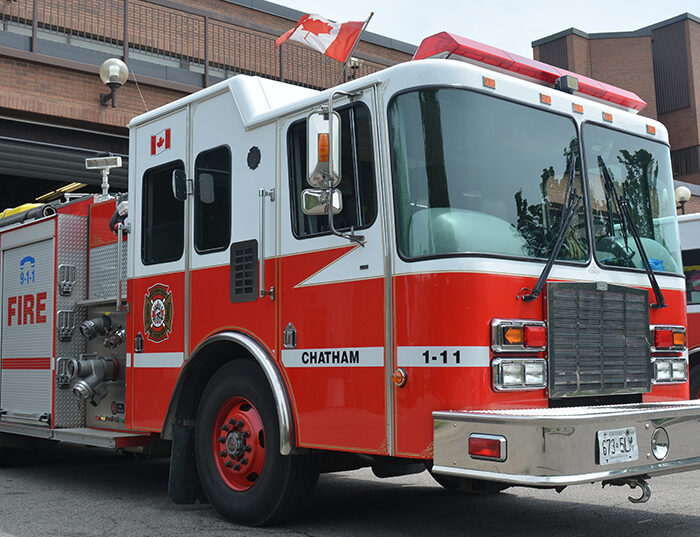
By Pam Wright
Local Journalism Initiative Reporter
Chatham-Kent has a new Master Fire Plan.
Four years in the making, the comprehensive document is to be used as a blueprint for change for C-K’s Fire & Rescue Service over the next 10 years.
“The idea behind this is we want to bring you the concept, and then in future years, future budget processes, we can then bring to you some of the details if it comes up through implementation,” Chatham-Kent Fire & Rescue Chief Chris Case told council at a recent meeting, noting the document is to be utilized to shape strategic change.
In 2020, council awarded a contract to Dillon Consulting to develop a C-K community risk assessment. Completed in 2022, the Master Fire Plan incorporated the results of the assessment.
Dillon’s Suzanne Charbonneau-Dent, who presented the Master Fire Plan to council, said the goal is to work towards bringing the entirety of Chatham-Kent’s fire service into a fully-integrated “composite” fire service model.
According to Charbonneau-Dent, a divide still exists between full-time career firefighters and volunteer firefighters, leftover from when C-K’s 19 fire stations were blended in amalgamation.
The plan did not include any dollar amounts, but its recommendations have hefty financial implications, including hiring more staff and the relocation of Station 1, Chatham’s main firehall.
Currently, the plan recommends that a new fire hall be constructed in the vicinity of Richmond and Lacroix Streets.
Hiring more staff would include the addition of two career district fire chiefs that would be on-the-job 24/7, Charbonneau-Dent said. To accomplish that, CKFR would need to hire 12 firefighters to staff both positions.
The role of a district chief would be that of a “change maker,” Charbonneau-Dent explained.
The plan also recommends hiring additional staff for administrative, training, inspection and public education and fire prevention roles.
Changing the title of volunteer firefighter to “on-call paid volunteer firefighter,” is another recommendation, Charbonneau-Dent said, to ensure volunteers are engaged and “feel valued.
“The big thing is how it’s portrayed in the community,” she added. “If you’re asking volunteers to sign up and become volunteer firefighters, it makes it sound like there’s no compensation for that.”
At present, excluding the chief and four assistant chiefs, 72 career firefighters man the two Chatham stations and the Wallaceburg station. Each site has four captains and 16 firefighters, with Wallaceburg also having 10 volunteers ready to provide backup.
Changing the volunteer title more accurately reflects there is compensation for their service and individuals who step into the role are not just serving the community, Charbonneau-Dent noted. The plan also recommends career and volunteer firefighters receive the same training, something not currently standardized within the service.
At C-K’s rural fire stations a total of 322 volunteer firefighters are part of the service, with 340 slots available.
An additional apparatus truck to deal with C-K’s increase in taller buildings would also require more staff, and is also recommended, council heard, as well as the possibility of building a third fire station for Chatham.
Improving response time is another goal of the plan. It recommends that 15 firefighters arrive on scene in a nine-minute turnout, plus travel time for up to 90 per cent of fire suppression incidents in urban areas, and that six firefighters arrive on scene in a 14-minute turnout time, plus travel time, to 80 per cent of suppression calls in rural areas.
Chatham Coun. Marjorie Crew urged council to support the plan, calling it a “roadmap” for the future, noting all future financial requests will need to be approved by council during budget.
South Kent Coun. Ryan Doyle, a volunteer firefighter with Station 15, asked how fire protection is provided for Wallaceburg. Chief Case explained that if a second truck is needed, it comes from Chatham. If more firefighters are needed, career firefighters are called in on overtime. Subsequently, volunteers are called in if needed.
The Master Fire Plan also recommends CKFR enter into a dispatch agreement with the Chatham-Kent Police Service to provide emergency dispatch services.
When it comes to determining dollars and cents, Charbonneau-Dent, said the plan is evidence-based drawing on “best practices.
“I know from my experience that a well-operating composite fire service delivery model really does bring the best value for a community,” Charbonneau-Dent said.
Determining the financial implications of the plan is part of next steps, she said.






